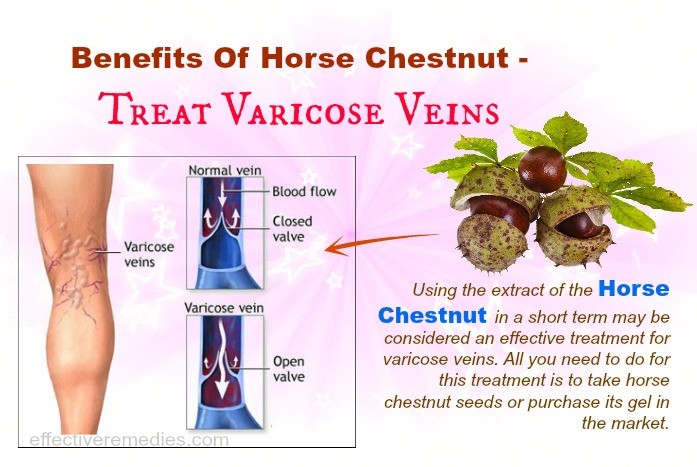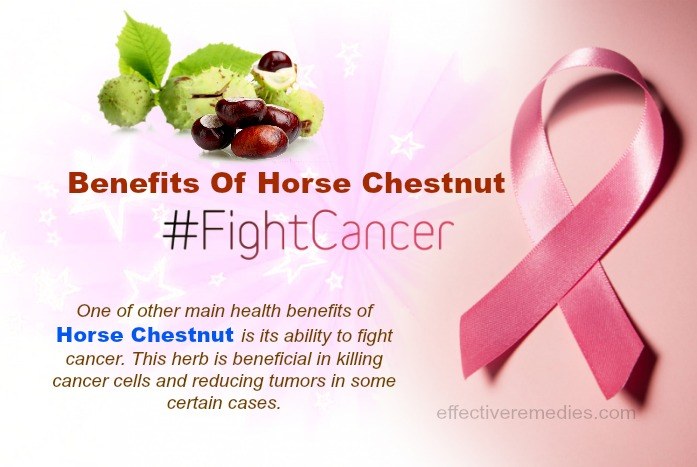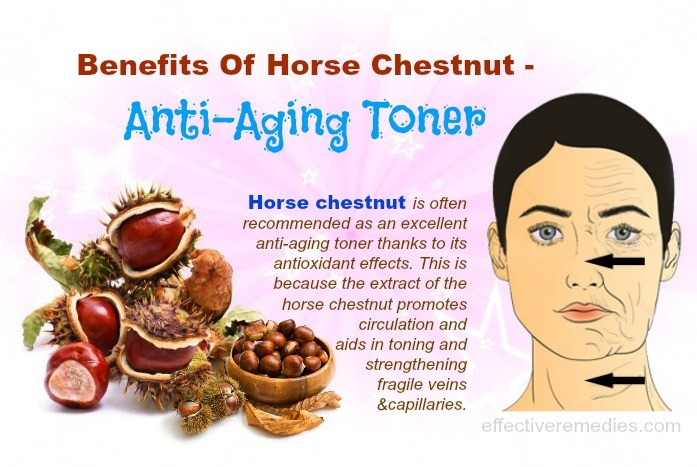What Is Horse Chestnut?
Scientific names: Aesculus californica, Aesculus hippocastanum, Aesculus glabra
Common Names: Castagno D'India, Atkestanesi, Buckeye, Castanheiro Da India, Castano De Indias, Castano De India, Castogno D'India, Common Horse Chestnut, Chataigne De Cheval, Eschilo, Ippocastano, Marronnier D'Inde, Horse Chestnut, Paarde Kastanje, Seiyo-Toti-No-Ki, Rosskastanie, Spanish Chestnut, Wilde Kastanje,T'ien-shih-li
Horse chestnut is grown to Asia, Northern Greece, North America, Balkan Peninsula, and Europe. Horse chestnut leaves, bark, flowers, and seeds have been used to help treat a lot of health problems for centuries. Its seeds have a great place in the European phytotherapy and may be used to deal with vascular issues. Horse chestnut has a significant amount of a poison named esculin and may cause death if taken by mouth in the raw form. So, to know the benefits of horse chestnut on health, uses, and side effects, you should visit the Effectiveremedies.com site and read this article right now.
What Are The Benefits Of Horse Chestnut And Uses On Health?
According to The Encyclopedia of Medicinal Plants of a medical herbalist – Andrew Chevallier, horse chestnut was believed as a medicinal herb in 1565 in the Dioscorides’s Materia Medica. It has been widely used in the traditional medicine in Europe since the sixteenth century. The lotions and creams contain horse chestnut have traditionally been used to speed up the healing process of blunt sports injuries. In addition, this herb has been used to deal with aging skin, hair loss, and cellulite, though there is little research to support this benefit.
Horse chestnut is loaded with a compound named aescin that has some observed prospective benefits. According to research in China, aescin may resist swelling and systemic redness without being immunosuppressive. In addition, it also contains very strong antioxidant effects. According to information published by Middlesex University in England, horse chestnut extract is one of the effective treatments for free radicals. Moreover, aescin is a saponin that is added to natural soap products. For now, check the list of its uses on health and beauty.
1. Health Benefits Of Horse Chestnut – Improve Vein Health & Versatility
In fact, studies have shown that the extract of the horse chestnut offers the same effect to compression socks while it also aids in contracting arteries and veins. In the “Journal of the Norwegian Medical Association”, European people often use the extract of the horse chestnut seeds to cure chronic venous insufficiency. According to a research carried by the University of Milano in Italy, aescin in this extract works as effectively as a compression therapy for treating chronic venous insufficiency, hemorrhoids, and edema. This is because, at the lowest level, the extract of the horse chestnut seeds is thought to prevent the breakdown of proteins in the capillary walls.
EffectiveRemedies Partner Solutions

Ask a Doctor Online and Get Answers in Minutes, Anytime!
Have medical questions? Keep asking questions to a Verified Expert until you get the answer you need.
According to another 1996 study in The Lancet, consuming 50 milligrams of aescin (one of the active ingredients in horse chestnut) twice per day for 12 weeks worked as well as using compression stocks.
2. Benefits Of Horse Chestnut – Treat Rheumatoid Arthritis
The extract of the horse chestnut is famous for its anti-inflammatory effects. Therefore, it is widely used to treat arthritic and rheumatic aches, sprains, and pains. In fact, a lot of massage products used by athletes to treat joint or muscular pain after extraneous workouts contain horse chestnut. To treat rheumatoid arthritis, mix 1 tbsp. of the horse chestnut oil in 1/2 tbsp. of olive oil and apply or massage this oil mixture on the affected areas 2 times daily.
See more: Natural Home Remedies For Arthritis Pain
3. Benefits Of Horse Chestnut – Treat Varicose Veins
According to Cochrane Collaboration, using the extract of the horse chestnut in a short term may be considered an effective treatment for varicose veins. All you need to do for this treatment is to take horse chestnut seeds or purchase its gel in the market. You can get the detailed directions at Varicose Veins Remedy No. 12
4. Health Benefits Of Horse Chestnut – Treat Tired And Heavy Legs
To treat tired and heavy legs, simply massage your legs with a little horse chestnut oil and then use a blanket to wrap your legs for 15 to 20 minutes. In addition, you may also mix horse chestnut oil with some drops of grapeseed extract to get faster relief from this issue.
5. Benefits Of Horse Chestnut – Treat Carpal Tunnel Syndrome
The aescin – a compound found in horse chestnut is effective in treating the inflamed nerves around the wrist and stimulating the blood circulation. You may apply horse chestnut topically or take it orally in the tincture or tablet forms.
See more: Natural Home Remedies for Carpal Tunnel Syndrome in Wrist
6. Health Benefits Of Horse Chestnut – Treat Hemorrhoids
According to a review in 2001, taking horse chestnut supplements may prevent painful complications of hemorrhoids. You just need to take horse chestnut capsules or tea for this treatment. For more information about other natural remedies for hemorrhoids, click at the Hemorrhoids Home Remedies
7. Benefits Of Horse Chestnut On Health – Fight Cancer
One of other main health benefits of horse chestnut is its ability to fight cancer. This herb is beneficial in killing cancer cells and reducing tumors in some certain cases. However, more studies are needed to ensure the usefulness and security of this method. You may take horse chestnut capsules or tea for fighting cancer.
8. Benefits Of Horse Chestnut – Get Rid Of Spider Veins
Take 10 tbsp distilled witch hazel and then add 1 tbsp horse chestnut tincture to this. Next, mix them together to form a mixture. Now, you can apply the mixture to your spider veins.
Or, mix equal part of the horse chestnut extract & grape seed oil and then gently apply it to the affected areas before bedtime. Now, leave it overnight. Another option, you may consume 250 milligrams of the extract of the horse chestnut seeds daily until your problem is treated.
9. Benefits Of Horse Chestnut – Remove Rosacea
The extract of the horse chestnut helps to treat vascular problems effectively. It also aids you in relieving inflammations in the body. Moreover, this extract is also useful in easing inflammation caused due to rosacea because it may reduce the development of the blood vessels. Applying a topical cream containing the horse chestnut helps to deal with rosacea. You may get detailed instructions of using horse chestnut for this skin issue at Rosacea Home Remedy Tip No. 19
10. Benefits Of Horse Chestnut – Anti-Aging Toner
Horse chestnut is often recommended as an excellent anti-aging toner thanks to its antioxidant effects. This is because the extract of the horse chestnut promotes circulation and aids in toning and strengthening fragile veins &capillaries. In fact, it is one of the ingredients in many high-quality creams and lotions to reduce the appearance of fine line, wrinkles, and cellulite. Moreover, it is also added in many slimming, firming, and toning skin products. To get a healthy & glowing skin, simply combine 5 to 10 drops of the extract of the horse chestnut with 50 ml of vitamin E oil. Or, you may also add it to your favorite face moisturizer & apply it nightly before bed.
What Are The Side Effects Of Using Horse Chestnut?
It seems to be safe for most people to take a standardized product containing horse chestnut seed extract for a short time. Standardized products are tested to consist of exact levels of a verified chemical. Find products that are removed the toxic substance esculin. Horse chestnut products may sometimes cause adverse effects such as a headache, stomach upset, itching, dizziness, and stomach upset. Pollen on the horse chestnut flowers may cause an allergic reaction.
Raw horse chestnut seeds, barks, flowers, and leaves are unsafe and may cause death if taken by mouth by children or adults. Signs of poisoning are stomach upset, muscle twitching, kidney problems, weakness, enlarged eye pupils, loss of coordination, vomiting, depression, diarrhea, stupor, and paralysis. Accidental ingestion of this tree requires a medical attention. Children may experience one of these symptoms when drinking a tea from the twigs and leaves or eating horse chestnut seeds.
Special Precautions And Warnings:
Pregnancy & breastfeeding: Consuming the raw bark, seed, leaf, or flower is unsafe for pregnant and breastfeeding women and can cause death. The safety of taking horse chestnut seed extract that is removed the poisonous esculin during pregnancy or breastfeeding is still unknown. However, it is best to avoid using it if you are nursing or pregnant.
Diabetes: Horse chestnut may reduce blood sugar. If you suffer from diabetes, watch for symptoms of hypoglycemia (too low blood sugar) and check the blood sugar regularly.
Bleeding disorders: Horse chestnut may delay blood clotting. Taking this tree may increase the risk of bleeding and bruising in people suffering from bleeding disorders.
Digestion problems: The seeds and bark of the horse chestnut may irritate the gastrointestinal tract. Avoid using it if you suffer from bowel or stomach disorders.
Latex allergy: People allergic to latex may also be allergic to this tree.
Kidney disease: Horse chestnut may worsen kidney disease. Avoid using it if you suffer from kidney problems.
Liver disease: There is a report of liver injury related to using horse chestnut. Therefore, if you suffer from a liver condition, avoid horse chestnut.
Surgery: Horse chestnut may slow blood clotting. It may give you a higher risk of bleeding if you use it before surgery. Stop using it at least two weeks before a surgery.
Where To Buy Horse Chestnut?
You may find horse chestnut in the form of creams, oils, extracts, and lotions at many herbal food stores. When buying horse chestnut, look for safe amounts of the horse chestnut component in this product. For example, it should be about 4 to 12% in creams and lotions.
Here is the list of benefits of horse chestnut on health, uses, and side effects that you should not miss. If you want to learn more the benefits of other ingredients, please visit our Superfoods page.
References:
https://www.ncbi.nlm.nih.gov/pubmed/19247403
https://nccih.nih.gov/health/horsechestnut
http://www.uofmhealth.org/health-library/hn-2110008
More recommended articles:
Beauty & Health Benefits Of Olive Oil – Its Uses & Side Effects
Health & Beauty Benefits Of Tea Tree Oil – Its Uses & Side Effects
Manuka Oil Benefits On Health & Beauty – Its Uses & Side Effects
Health Benefits Of Maca Powder – Its Uses & Side Effects











